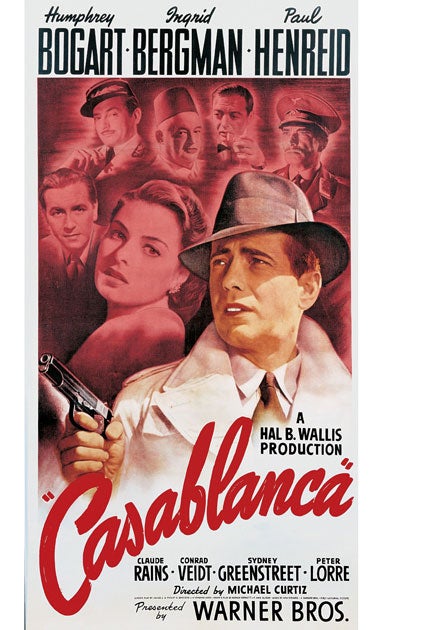Time goes by and Bogart's still a box-office hit
Re-releases of classic films such as Casablanca and The Third Man are big business, discovers Geoffrey Macnab

Your support helps us to tell the story
From reproductive rights to climate change to Big Tech, The Independent is on the ground when the story is developing. Whether it's investigating the financials of Elon Musk's pro-Trump PAC or producing our latest documentary, 'The A Word', which shines a light on the American women fighting for reproductive rights, we know how important it is to parse out the facts from the messaging.
At such a critical moment in US history, we need reporters on the ground. Your donation allows us to keep sending journalists to speak to both sides of the story.
The Independent is trusted by Americans across the entire political spectrum. And unlike many other quality news outlets, we choose not to lock Americans out of our reporting and analysis with paywalls. We believe quality journalism should be available to everyone, paid for by those who can afford it.
Your support makes all the difference."You must remember this," the song goes in Casablanca. Well, yes, we do. It is one of the most familiar moments in one of the most familiar films ever made. Audiences began their beautiful friendship with Michael Curtiz's movie in the middle of the Second World War. That friendship shows no signs of cooling. Casablanca, made in 1942, is about to be re-released in British cinemas for the first time in... five years. Last time Humphrey Bogart and Ingrid Bergman were back on the big screen in 2007 (to mark the 65th anniversary of Casablanca), the film made more than £100,000 at the UK box-office – no fortune but more than many new British pictures manage. The distributors (Park Circus) are confident the film, now 70 years old, will perform even better this time round when it is re-released in time for Valentine's Day.
On the face of it, audiences's fetish for watching Casablanca in cinemas is perplexing. We live in a digital age where images from the film can be summoned up in seconds on YouTube. Casablanca remains a staple of TV scheduling and has long been available on DVD .
Reruns are increasingly big business. Earlier this week, box-office analyst Charles Gant calculated that Carol Reed's The Third Man (1949), a 63-year-old British movie which has also been re-released umpteen times, had grossed more than £600,000 on its latest foray into the cinema. (That, Gant pointed out, was more than Andrea Arnold's Wuthering Heights or Lars von Trier's Melancholia had managed at the UK box office.)
The film is the most recent title to have been given the Secret Cinema treatment. That's to say, it was given an "event" release in a special location. Audiences watching the movie in a disused factory in Clerkenwell were plunged into a recreation of the world of Harry Lime's Vienna, complete with penicillin lab and police headquarters.
Back in 1999, when young British entrepreneurs Will Clarke and Danny Perkins set up a tiny new distribution company called Optimum Releasing, they started off by re-releasing films like The Third Man and Jean-Luc Godard's Breathless. With The Third Man, they arranged zither players at selected cinemas to play the twanging Anton Karas music from the film. Audiences looking for an alternative to Star Wars movies and other summer tentpole fare came in their droves. Less than a decade later, Optimum was sold to French major StudioCanal for a reported $30m and has gone on to produce films like Brighton Rock and to back such titles as Tinker Tailor Soldier Spy and The Tourist. For all its success with new movies, Optimum's business was built initially on re-releases.
There are obvious reasons why reruns work. The films are known quantities. They don't disappoint in the way that so many new movies do. For older audiences, they have a nostalgic quality. For younger audiences, they offer an opportunity for discovery. Hollywood's old attitude to preservation was underlined when (at least myth has it) MGM tried to have the British film version of Gaslight (1940) destroyed so that it would not get in the way of their 1944 US remake.
One glaring irony is that the producers of the films being re-released now didn't have any expectations at all that their wares would last. For Jack Warner and Hal Wallis at Warner Bros, Casablanca was just another movie on the studio supply line. They hoped it would make money but neither had any inkling it would still be in cinemas 70 years later, when most of the actors and technicians involved in making it were already long since dead.
'Casablanca' is re-released on Friday
Join our commenting forum
Join thought-provoking conversations, follow other Independent readers and see their replies
Comments